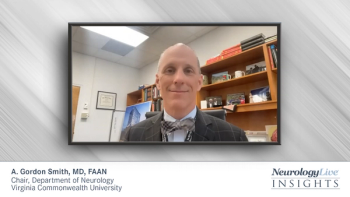
A. Gordon Smith, MD, FAAN, reviews prevalence and subtypes of myasthenia gravis. He also discusses how different antibodies contribute to the pathophysiology of the disease.

A. Gordon Smith, MD, FAAN, reviews prevalence and subtypes of myasthenia gravis. He also discusses how different antibodies contribute to the pathophysiology of the disease.

A. Gordon Smith, MD, FAAN, recounts the challenges of treating patients with myasthenia gravis. He also discusses care disparities and the need for rapid disease modification.

A. Gordon Smith, MD, FAAN, discusses the role of acetylcholine esterase inhibitors, immunosuppressive agents, IV immunoglobulin, corticosteroids, as well as newer agents in the treatment of myasthenia gravis.

A. Gordon Smith, MD, FAAN, considers how rituximab and eculizumab fit into the current standard of care for myasthenia gravis.

A. Gordon Smith, MD, FAAN, explores the rationale for targeting the neonatal Fc receptor and the mechanisms for efgartigimod for use in the treatment of myasthenia gravis.

A. Gordon Smith, MD, FAAN, discusses the findings and implications of phase 3 ADAPT trial and open-label extension study evaluating the use of efgartigimod in the treatment of patients with myasthenia gravis.

A. Gordon Smith, MD, FAAN, talks about how new agents and emerging data are enabling clinicians to personalize care for patients with myasthenia gravis.

A. Gordon Smith, MD, FAAN, discusses how to assess for treatment success and why the patient perspective is so important in deciding whether to change therapies.

A. Gordon Smith, MD, FAAN, describes the landscape of investigational therapies for myasthenia gravis, including plasma cells, CAR-T, antigen-specific tolerance.

A. Gordon Smith, MD, FAAN, talks about the importance of collaboration and education amid advances in myasthenia gravis treatment, from new formulations and routes of administration to innovative targets.